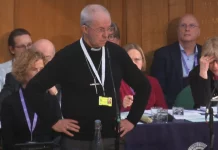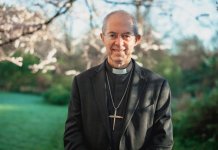I am one of the nearly 1,700 Church of England clergy and others who have signed an open letter to our bishops about the issue of transgender.
More than that, I am one of the informal team which has formed out of this spontaneous mass movement of Anglicans and got together to make the letter happen.
Why did I do that? Well, as I have written elsewhere, I would hope that transgender people are always as welcome as anyone else at our church. I would hope they would be baptised or renew their baptism vows as much as anyone. But as I also said in that same article, there are some problems with the existing guidance from the House of Bishops, and I think they are well worth flagging up.

Now part of contemporary ‘Bishop-speak’ seems to be ‘the language of listening’. Scarcely a week goes by without one or other bishop promising to listen to this, that, or the other group. For example, not long ago in the Diocese of Lichfield, Bishop Michael Ipgrave convened a ‘listening group’ to hear ‘concerns over issues of sexual orientation and gender identity’. And last October, bishops in Oxford diocese pledged themselves to ‘continue to listen to different streams’ in the ongoing debates about these topics. Last year also, Justin Welby tweeted that a good Lent (now only a few weeks away in 2019) ‘begins with paying attention and listening’. And he has promised that the Lambeth Conference of bishops in 2020 will be a time when those attending ‘listen to each other’.
So we can say without doubt that ‘listening’ is in vogue – and conversely, we might happily assume that turning a deaf ear is, equally, out of fashion. And that is just as well, because the 1,689 of us (and the number is still rising) who have signed this new open letter humbly hope that the details of what we set out within it may now be truly heard. Initial signs have not been promising; a statement in The Times from ‘the Church of England’ (who?) said the bishops would ‘give the letter their serious consideration’ – but then effectively appeared to bat it into the long grass. Furthermore, it did not suggest any of the usual actions which generally signify actual, genuine listening – such as meeting in person with some of those who have signed, engaging in detail with the specific issues raised, or setting out any kind of process of response. But it is listening in deeds we seek, not ‘listening’ as in words only, via a brief statement to the press.
And we ask not to be heard because of our numbers – though those should give pause for thought. We ask not to be heard because we are ‘right’ – for we do not claim to have all the answers. We ask not to be heard because we bring threats – for we come in the peace of Christ. We ask not to be heard at the price of excluding others – for by all means hear the voices of those who think differently from us, and especially those who experience transgender issues personally.
No: we ask to be heard because we believe the detailed theological questions we raise merit close examination. So we ask not to be dismissed with soundbites (‘this is not compulsory’) nor with platitudes (‘this does not change doctrine’) – for we have heard the soundbites and the platitudes, truly we have, and yet we still come to the table now with our voices, our questions, and the detail of the issues we raise. And we will keep coming until the details are answered.
We ask to be heard because the voice of the church, of which we are part, right across the world and through history, speaks mostly with a different voice on these matters to what we now hear from you. We cannot simply ignore the voice of brothers and sisters in Christ in other denominations, in other continents, at other times and places. And we ask to be heard because the voice that should be heard above all is not ours but the voice of God through Scripture – and we do not believe the existing guidance has yet engaged with that fully. We ask to be heard because we wish to walk with you, our shepherds in Christ, our bishops, to the Word of God once more and to say to you, ‘Show us – please show us, how may our questions be answered from these pages?’
So respectfully, and from our hearts, we ask you to listen. To engage, point by point, in detail, with the matters being raised. To listen from the heart, with minds engaged, and in so doing to hear the questions well. And as you engage with us, listen to us, pray with us, we assure you of our prayers. We are fellow pilgrims together, walking as part of his church, under the authority of his ever-speaking Word. For it is his voice and his voice alone that counts – not ours.
So bishops, as you truly listen and engage, may the Lord bless you and keep you; may the Lord make his face to shine upon you and be gracious to you; may the Lord turn his face toward you and give you his peace – now and always. Amen.










